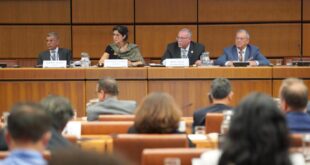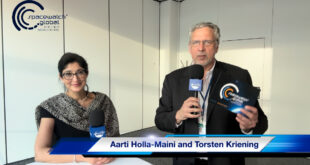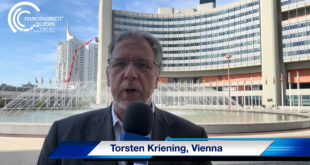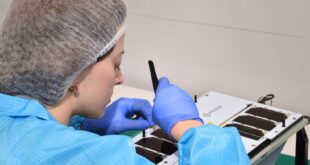By Pascale Ehrenfreund
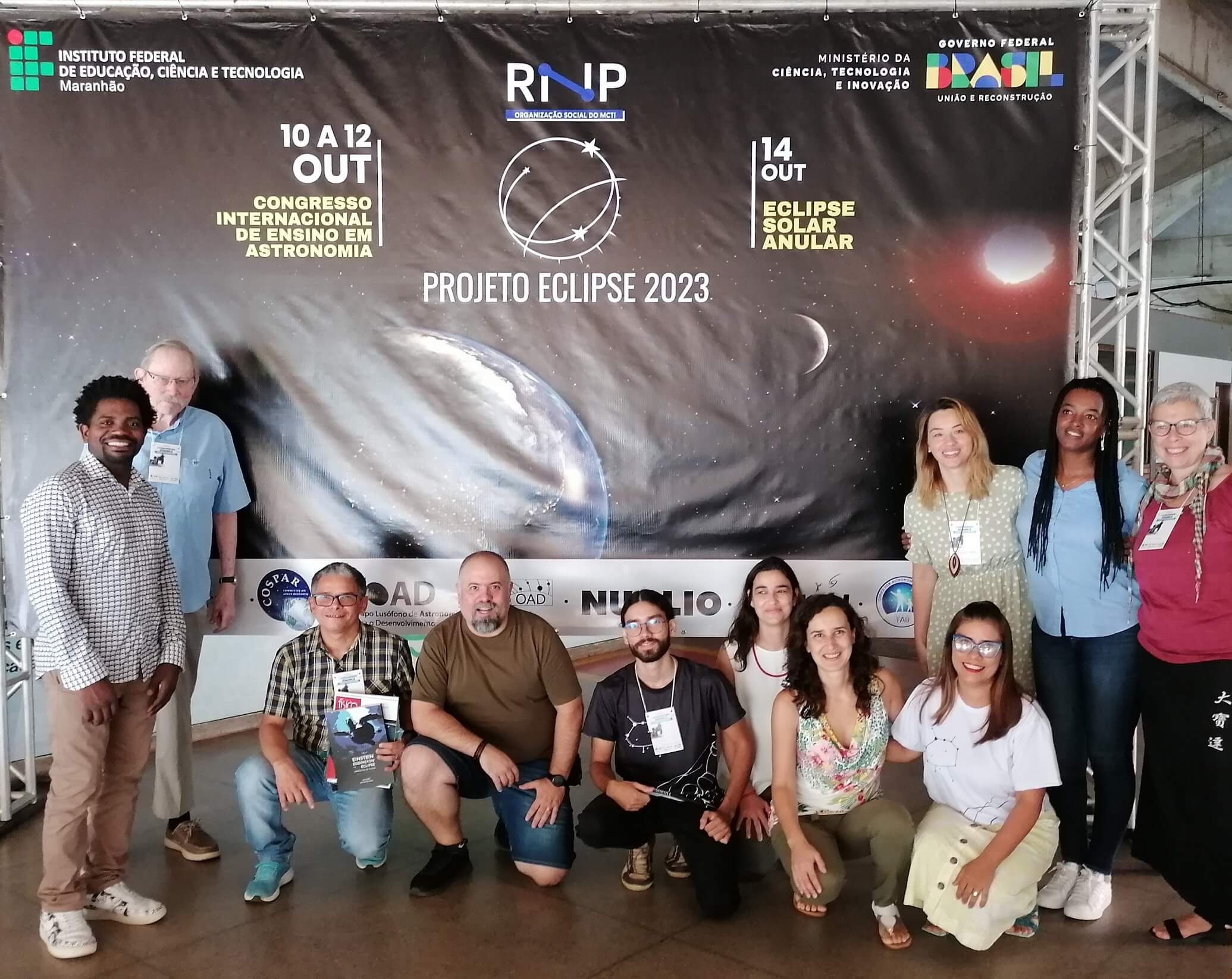
Space research is shaping the future of the space sector in several profound ways. It advances our understanding of the universe, enhances technologies, fosters international cooperation, inspires the next generation, and creates new opportunities for scientific discovery and economic growth. Space research drives the development of innovation and new technologies that are not only pivotal for space endeavours but also beneficial for terrestrial applications. Innovations in materials science, robotics, and telecommunications developed for space missions often find applications in industries like manufacturing, healthcare, and mobile communications. Space research fosters international cooperation, as collaborative efforts, such as the International Space Station (ISS), can achieve shared complex goals and promote peaceful relations. Additionally, space missions ignite curiosity, inspiring the next generation of scientists, engineers, and society at large, and encouraging educational initiatives and public interest in STEM fields, which helps cultivate a technically skilled workforce. Space research is crucial for understanding and mitigating existential risks such as asteroid impacts or the effects of solar flares, which pose significant threats to life on Earth. Efforts to monitor and characterize these potential hazards rely heavily on the technologies and knowledge derived from space research. In summary, space research is a dynamic and integral component of the space sector, continually pushing the boundaries of what is possible and driving progress across multiple dimensions—technological, scientific, economic, and beyond. It not only shapes the present capabilities of the space industry but also sets the stage for future advancements and the long-term sustainability of space activities.
Committee on Space Research (COSPAR): Today and Tomorrow’s Space Sector
Established in 1958 under the International Science Council (ISC), the Committee on Space Research (COSPAR) aims to advance scientific research in space on a global scale. Today, COSPAR is the premier international scientific society in space research, with 46 national scientific institutions and 13 international scientific unions. COSPAR leverages the expertise of over 13,000 space scientists. COSPAR’s eight scientific commissions encompass all space science disciplines, including Earth and atmospheric sciences, planetary science, astrophysics, solar and space plasma physics, and life and microgravity sciences. COSPAR’s panels and task groups focus on specialized areas of space research, furthering its mission through biennial Scientific Assemblies and Symposia, space projects, roadmaps, and publications, thereby promoting development across the entirety of space science domains.
COSPAR was created during the Cold War to provide a neutral forum for space scientists, fostering essential conversations and partnerships across the space sector. The Committee on Industry Relations (CIR), a recent COSPAR initiative, explores effective ways of integrating industry capabilities with international space research efforts. The exchange of knowledge and innovative research findings is essential for informing policy decisions, translating scientific discoveries into practical standards, and ensuring the sustainability of space activities.
COSPAR and the United Nations: Protecting the planets
Since its inception, COSPAR has partnered with the United Nations Committee on the Peaceful Uses of Outer Space (UNCOPUOS) to advance space science in alignment with global standards and treaties. As the first organization granted observer status in UNCOPUOS in 1962, COSPAR has collaborated with the United Nations Office for Outer Space Affairs (UNOOSA) on various topics of joint interest. The COSPAR Panel on Planetary Protection, for over six decades, has been instrumental in upholding the principles of the Outer Space Treaty of 1967, advising on preventing biological contamination of celestial bodies and adverse changes in the Earth’s environment from extra-terrestrial matter. This panel exemplifies proactive international cooperation, by assembling space agency representatives and leading scientists to establish and disseminate planetary protection standards globally. Through initiatives like the first Planetary Protection Week (London April 2024), COSPAR facilitates the exchange of insights and best practices, reinforcing its pivotal role in maintaining the integrity of space exploration.
International cooperation among space scientists has become increasingly important.
COSPAR’s Panel on Potentially Environmentally Detrimental Activities in Space addresses the pressing issue of space debris, including research on upper atmosphere contamination and policy development to manage cislunar space debris. The COSPAR Commission B “Space Studies of the Solar System” and the COSPAR Panel on Space Exploration emphasize planetary environmental stewardship, including the utilization of space resources on celestial bodies like the Moon, Mars, and asteroids. COSPAR supports the establishment of the Action Team on Lunar Activities Consultation (ATLAC) under UNCOPUOS, highlighting the need for coordinated efforts and shared research on the environmental impacts of lunar activities.
COSPAR’s Panel on Space Weather plays a critical role in analysing the impact of space weather and hosts the International Space Weather Action Teams (ISWAT) for community-coordinated collaborations addressing space weather challenges like the G4 storm witnessed in May 2024. This strong partnership with UNCOPUOS led to the establishment of a Coordination Team on Space Weather between the World Meteorological Organization (WMO), COSPAR, and the International Space Environment Service (ISES). COSPAR, in partnership with WMO and ISES, coordinates gap analyses and communicates the findings from the research community to national and regional space weather programs. This initiative aims to encourage the deployment of new space- and ground-based instrumentation and facilitate the development of new techniques for forecasting potentially harmful changes in solar, heliospheric, magnetospheric, ionospheric, and atmospheric environments on Earth and other planets. A dedicated task group is pioneering the establishment of a constellation of small satellites to monitor the ionosphere, improving our ability to forecast space weather events and study the upper atmosphere or cislunar space.
The Dark and Quiet Skies initiative, established by the International Astronomical Union (IAU), NOIRLab, and SKAO, addresses the problems of light pollution caused by satellite constellation streaks for ground-based observatories. COSPAR strongly supports this initiative, particularly within the “Group of Friends” (GOF) advocacy group established by Chile and Spain. Thanks to the GOF’s efforts, the UNCOPUOS Scientific and Technical Subcommittee has agreed to include an agenda item on “Dark and Quiet Skies, astronomy and large constellations: addressing emerging issues and challenges” for the next five years.
What’s next? COSPAR’s Strategic Action Plan for 2024-2028
COSPAR leads the way in encouraging vital conversations and partnerships across the space sector, connecting space agencies, space companies, decision-makers, and scientific organizations worldwide. COSPAR’s Strategic Action Plan for 2024-2028 outlines an ambitious agenda emphasizing new missions, an enhanced role in the international space arena, nurturing the next generation of scientists, and exploring avenues for sustainability and growth. Recognizing the dynamic nature of the space ecosystem, the plan calls for COSPAR to expand its influence and contribute significantly in key strategic areas, including climate science, space weather, planetary science, the dawn of new space exploration and astronomy, and space sustainability. The plan emphasizes in particular the importance of COSPAR’s role in the global space sector, showcasing how its established international network can foster, bridge, and rejuvenate scientific cooperation across borders. The plan also highlights the importance of innovative space technologies, fostering science-industry relations, education, capacity building, leveraging small satellites for interdisciplinary projects, diversity, and outreach.
- Pioneering Technologies Shaping the Future of Space Exploration
The COSPAR Panel on Innovative Solutions (PoIS) charter aims to bring state-of-the-art technology to address the hardest problems facing COSPAR researchers. PoIS first focused on predicting adverse events from solar activity and applying those tools to atmospheric modelling of Mars, Earth, and Venus. This effort led to the creation of the Space Innovation Lab, in partnership with the Cyprus Space Exploration Organization, where AI and machine learning (ML) analyse solar activity.
As cislunar infrastructure develops, a permanent human presence around the Moon is expected in the next 5-10 years. PoIS has started applying AI/ML to biological material analysis post-space-exposure, in an effort to identify changes without an associated phenotype. Recognizing the disruptive potential of quantum computing, COSPAR will bring this topic to the Scientific Assembly in Busan in July 2024. Quantum computers’ ability to analyse massively complex combinatorial problems will be crucial for space biological analysis and other challenges.
- Collaboration Between Space Research and the Industrial Sector
The Committee on Industry Relations (CIR), established in COSPAR’s 2019-22 Strategic Plan, engages industry representatives in advancing scientific research, Earth remote sensing, space weather, planetary exploration, planetary protection, advanced spacecraft and instrument development, and the scientific exploration of the Moon. The CIR includes 18 companies from Asia, the US, and Europe, with plans for industry panels on topics such as JWST, the Habitable Worlds Observatory, Orbital Debris, AI and Quantum Computing, Space Law and Policy, and the evolution of Launch Services at the upcoming COSPAR Scientific Assembly in Busan. Additional companies are welcome to learn more about the CIR and contact [email protected] about joining.
- Education opportunities and capacity-building in space research
Education and capacity-building in space research are critical pillars of COSPAR’s strategy. There is no sustainability without new generations of confident and properly empowered students, there is no empowerment of learners without prepared and encouraged educators, and there is no encouragement for educators when there is no whole-school approach towards the integration of space as a window to innovation and inclusion. There is an urgent need to shortcut the road from school education to future careers, by initiating and involving students in real-world challenges and applications as early as possible. Promoting STEM education, particularly for girls and young women, is crucial for empowering future generations of space employees, fostering confidence in students, and shortening the necessary time to upskill professionals entering the growing marketplace of space-related careers.
COSPAR’s Panel on Education has organized professional development opportunities for teachers since 2012, benefiting over 300 educators. The panel plans to create a Space Education Ambassadors Scheme to train more educators and expand training opportunities globally. COSPAR is also looking into the potential of a funding scheme where training opportunities can reach as many countries as possible with professional development opportunities.
Space research not only shapes the present capabilities of the space industry but also sets the stage for future advancements.
COSPAR’s capacity-building program assists scientific advancement in developing countries, emphasizing the use of scientific data from space missions. COSPAR has organized in recent years 43 capacity-building workshops in various space disciplines in 22 developing countries, with over 1,200 students from more than 70 countries participating. Hands-on targeted and practical research opportunities for scientists in developing countries as well as building up a research infrastructure is essential. In 2024, four workshops in Thailand, China, Uzbekistan, and Kenya will focus on topics such as JWST Data Analysis, X-ray astrophysics, solar physics, and ionospheric physics. A new initiative starting in 2024 will involve students from developing countries in small satellite design, building, testing, and operations, supporting university labs in those countries. Small satellites play a significant role in scientific areas like real-time Earth’s atmosphere study and lunar and planetary exploration. COSPAR’s overall plans include establishing a constellation of small satellites for space science with various public and private partners.
- Championing Diversity and Inclusion in the Space Sector
COSPAR’s 2019 Strategic Plan established a renewed policy for diversity and inclusion, actively promoting these principles across all activities. The IDEA initiative aims to encompass inclusion, diversity, equity, and accessibility, driving growth and impact for COSPAR’s global constituents. The Task Group on the IDEA Initiative (TGII), launched at the 2022 General Assembly, includes 34 members from 14 nations, incorporating IDEA principles into COSPAR’s programs, honours, awards, and governance. In 2023, TGII organized a gender-diversity panel for the Scientific Symposium in Singapore and presented IDEA principles at capacity-building workshops. In 2024, COSPAR will host a discussion on advancing positive sustainable change in education and the workforce at the Scientific Assembly in Busan, South Korea.
In conclusion, COSPAR’s multifaceted efforts to promote knowledge exchange, foster innovation, and build partnerships underscore its dedication to addressing the comprehensive spectrum of space research and shaping the future of global space ecosystems. These efforts are integral to COSPAR’s vision for a collaborative, innovative, and sustainable future in the space sector. International cooperation among space scientists has become increasingly important. As we approach the 45th COSPAR Scientific Assembly in Busan in July 2024, we extend a heartfelt invitation to join us in advancing the frontiers of space science and cooperation. The program is packed with the latest discoveries presented by top space scientists, high-level meetings of space agency leaders, industry panels, interdisciplinary lectures, engaging public talks, and exhibitions from major space agencies and industry. The event promises unparalleled networking opportunities with key decision-makers, industry leaders, academics, and government officials, as we continue to navigate the challenges and opportunities of space exploration together.

Prof. Pascale Ehrenfreund is the President of the Committee of Space Research (COSPAR) and Research Professor of Space Policy and International Affairs at the Space Policy Institute/George Washington University in Washington DC. She serves on the Board of Directors of the Space Foundation and is Co-Chair of the Global Future Council on Space of the World Economic Forum. For three decades she contributed as Principal Investigator, Co-Investigator and Teamleader to ESA and NASA astronomy and planetary missions as well as experiments in low Earth orbit and on the International Space Station. Pascale Ehrenfreund was the President of the International Space University (2021-2023), the President International Astronautical Federation (2019-2022), the Chair of the Executive Board of the German Aerospace Center (DLR) (2015-2020) and the President of the Austrian Science Fund (FWF) (2013-2015). Pascale Ehrenfreund is enlisted in the Stanford World Ranking Top 2% Scientists 2022 and holds a Master degree in Molecular Biology, a PhD in Astrophysics, and a Master degree in Management & Leadership. The asteroid “9826 Ehrenfreund 2114 T-3” bears her name.
 SpaceWatch.Global An independent perspective on space
SpaceWatch.Global An independent perspective on space

